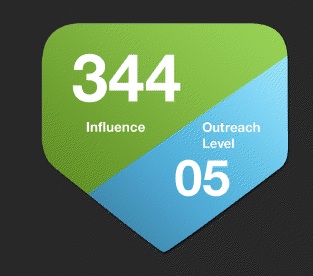Reputation on the Internet is a tricky thing to measure. But with the rise of social media—with its retweets, likes, +1s, replies, and followers counts—companies are trying to keep score. If you are a big user of Twitter, you have probably checked out your Klout score or at least heard of it. Well, soon Klout will have a competitor called Kred. It is currently accepting sign-ups for a gradual rollout starting next week.
Kred is the latest product from social data mining startup PeopleBrowsr. “We have been receiving the firehose since 2008,” says CEO Jodee Rich, referring to the full Twitter firehose, “indexing it since then. We have sorted it by community and topic. We look for small close networks of people and look for how they can be just as influential as rockstars.”
Every person or account on Twitter has a Kred score, which is made up of two parts: the influence score and the outreach score. Your influence score is a measure of your ability to inspire others. It is a number on a scale from 1 to 1,000, and is based on how often your tweets are retweeted, how many new followers you are gaining, and how many replies you generate. (Kred also looks at Facebook likes and Google +1s, but Twitter is the main source of data). It is very much like your Klout score. The Outreach score is measured in levels and is a reflection of how generous you are with retweeting and replying to others.
Kred also figures out which of 200 communities you belong to based on the information in your Twitter bio (which is not always a great description of who you are). It can show you the influence of your whole community and how you rank in that community. “Everyone is an influencer somewhere,” says Jodee. “Our job with Kred is to show you where you have influence.” Brand managers will be able to define their own communities (for a fee), which they will then be able to track.
 So how is this different from Klout? The main difference is Kred’s transparency. It shows you exactly how you got your score and lets you drill down to every retweet to see how many points it was worth. A normal retweet might be worth 10 points, but one from somebody with high Kred might be worth 50. A mention is worth more than follow, and so on. Since Kred is calculating everyone’s scores in realtime, it normalizes your score against the average.
So how is this different from Klout? The main difference is Kred’s transparency. It shows you exactly how you got your score and lets you drill down to every retweet to see how many points it was worth. A normal retweet might be worth 10 points, but one from somebody with high Kred might be worth 50. A mention is worth more than follow, and so on. Since Kred is calculating everyone’s scores in realtime, it normalizes your score against the average.
Kred also lets you incorporate your real-world accomplishments like degrees, honors, awards, and certificates. You will be able to send Kred a PDF proving an offline achievement, and they will add it to your Kred.
